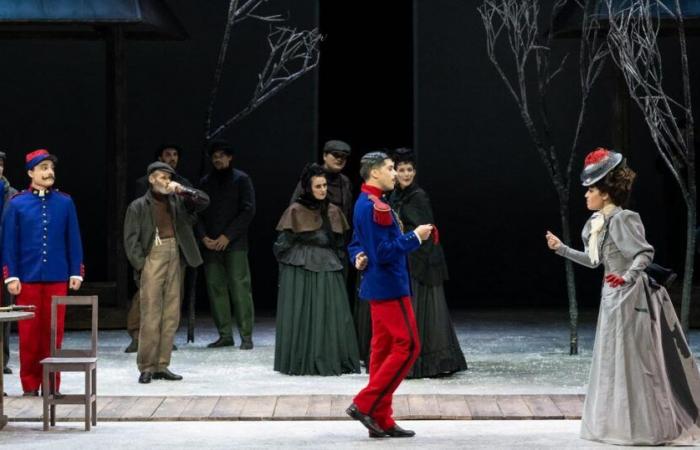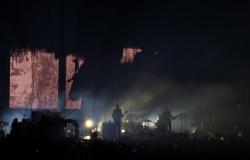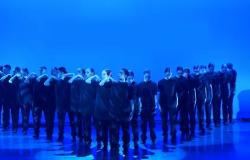A delicate and finely crafted work, “Fortunio” by André Messager unfolds on the stage of the Lausanne Opera in a production by Denis Podalydès. With its Music halfway between cabaret and operetta, this “boulevard opera” ranges from the comic to the dramatic register.
“Fortunio”, an adaptation of the play “Le chandelier” by Alfred Musset, was created in the heart of the Belle Epoque, in 1907, at the Opéra-Comique in Paris. Performed until 1948, this lyrical comedy in four acts composed by André Messager then fell into oblivion, until the French actor Denis Podalydès and the conductor Louis Langrée took it up in 2009 to offer it a very theatrical version.
It is this production that the Opéra de Lausanne is presenting until November 24. The Vaud institution welcomes Messager’s work within its walls for the first time in its history.
Reasons and feelings
The work bears the name of a young notary clerk, Fortunio (Pierre Derhet), a shy and introverted young man who falls madly in love with Jacqueline (Sandrine Buendia), the wife of his boss, the bourgeois Maître André (Marc Barrard). . But Jacqueline gives in to the advances of an attractive soldier, Clavaroche (Christophe Gay). To distract the jealous husband’s attention, the captain encourages Jacqueline to use Fortunio as a “candlestick”, an official suitor who attracts suspicion and thus leaves the true lover in the shadows.
The choice of course falls on Fortunio, who reveals in a sumptuous air all the love he has for Jacqueline, without naming her (“If you think I’m going to say who I dare to love…”). Touched, Jacqueline decides to help him. Lover and husband try to trap Fortunio, in vain. The latter manages during the last act to slip into Jacqueline’s room, who welcomes him with tenderness.
Musical lace
Entirely sung, with no spoken part, Messager’s work requires excellent singers coupled with impeccable actors, as the opera leans towards the boulevard play while deploying musical pages of extreme finesse.
Pierre Derhet, with very clear diction, composes an excellent Fortunio, sincere, naive, totally excessive in his amorous impulses. Sandrine Buendia aptly embodies an indecisive Jacqueline, shaken by the sentimental dilemmas she is going through. However, during the premiere on Sunday evening, his voice sometimes seemed restrained. Marc Barrard, who plays Maître André, plays the jealous but delicate husband with humor, while Christophe Gay, with beautiful vocal projection, plays a manipulative Clavaroche.
In the pit, Lausanne conductor Marc Leroy-Calatayud brilliantly conducts the Sinfonietta with the emotion befitting this “pearl of the repertoire. ‘Fortunio’ is the ideal work to discover opera, it is a light comedy , something very simple that speaks to everyone,” he says in the program A l’opéra on November 16.
>> Listen to the interview with chef Marc Leroy-Calatayud:
“Passages that upset”
With a direction by Denis Podalydès, sets created by Eric Ruf and costumes designed by Christian Lacroix, immense men of the theater came together around this work “deserving to be known to the general public”, continues the conductor.
A recognized actor in both theater and cinema, Denis Podalydès, who in 2009 directed his first opera with “Fortunio”, says nothing else. “It’s a very unique piece, musically magnificent, with passages that move the heart,” he explains in Musique Matin of November 19. “I discovered opera through ‘Fortunio’. This work made me discover the pleasure of opera.”
>> Listen to an interview with Denis Podalydès about his production of “Fortunio”:
Melissa Härtel
Comments collected by Serene Regard and Sydney Fierro
“Fortunio” by André Messager, directed by Denis Podalydès, with Pierre Derhet, Sandrine Buendia, Marc Barrard, Christophe Gay, the Sinfonietta under the direction of Marc Leroy-Calatayud, Opéra de Lausanne, to be seen again on 19, 22 and November 24, 2024.






